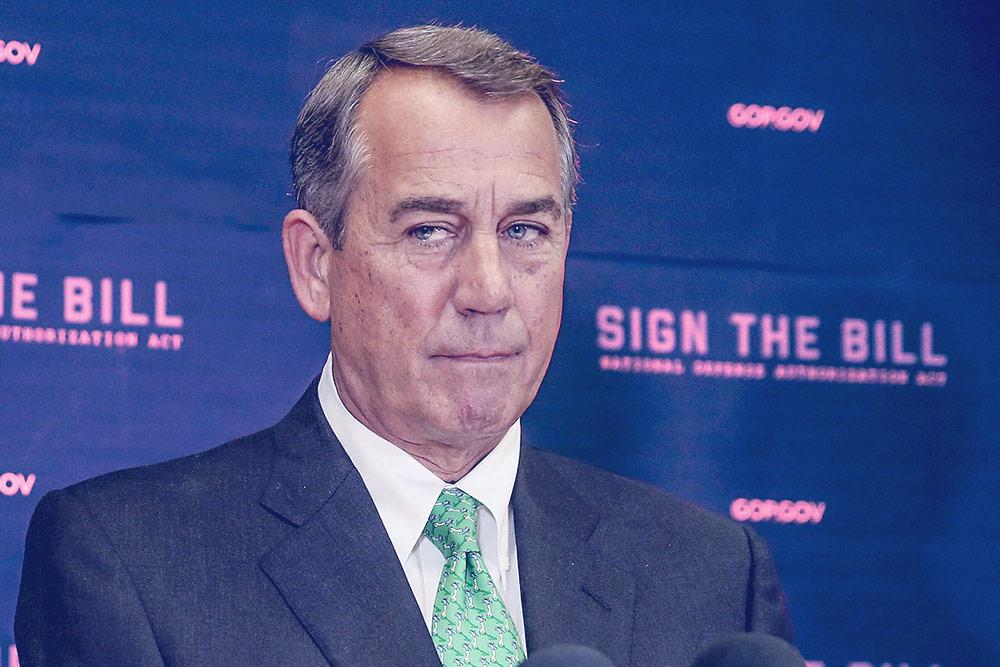Rejoice, America: With the new budget and debt deal struck by congressional leaders and the White House late Monday, the Obama-Boehner Era of Constant Arbitrary Crises is over. Enjoy the next 18 months of relative solitude while it lasts. We don’t know who the president will be the next time the debt ceiling needs a lift. We can’t even be sure who the speaker or Senate majority leader will be. All we know for certain is that in early 2017, the source of the problem—the members of the House Freedom Caucus, or at least most of them—will still be there, and they will still be subject to the same political pressures that have made their band the toxic force against governance that it is today.
The only way the federal government is able to function properly right now is for a sitting speaker to blow himself up. John Boehner has been exhausting all the capital he accrued within his conference, over some 20 years of service, from the day he assumed the gavel. After the exhausting spending and debt ceiling battles of 2011 and the 2013 government shutdown, Boehner spent the last two years relying on Democratic votes to fund the government and lift the debt limit. The Tea Party members whose numbers propelled Boehner to the third-highest position in American government five years ago—now voting en bloc under the recently certified House Freedom Caucus—were preparing to oust him if he did it again. So he took himself out and pledged to “clean the barn” for his successor ahead of time.
The deal that was reported Monday night resolves the two stickiest lingering questions for the 114th Congress. It raises the debt ceiling through early 2017 and modestly lifts the spending sequestration caps over the course of two fiscal years. Republicans will sell the debt ceiling hike through a somewhat clever spin: that they were able to extract concessions from the White House after all. Eh, not really. The deal over spending is a deal that would have been necessary anyway, while a “clean” debt ceiling increase is simply thrown into the same legislative vehicle. As for that budget deal, it gives Democrats increases in discretionary spending and Republicans (and plenty of Democrats!) increases in defense spending. The White House also will allow Republicans a kick in the ribs to recipients of Social Security disability benefits, along with provider-side Medicare cuts. Those entitlement cuts will cost significant Democratic votes, and obviously the House Freedom Caucus is losing its mind. But the deal should still have enough votes to pass the House on Wednesday and the Senate sometime early next week.
The deal eliminates the source of the budget impasse—spending levels—though it does not completely eliminate the threat of a government shutdown. The budget offers a funding skeleton that will have to be filled in through appropriations bills in mid-December. Rep. Paul Ryan’s first test as speaker will be to usher those appropriations through without his members throwing in too many poisonous riders. He should have some room to navigate before being cast asunder, since it’s only his first test. But if he can’t achieve perfection, he, too, will already be on the Boehneresque path of capital depletion.
Speaking of Paul Ryan: What does he think about this deal? “Paul Ryan Silent as Permanent Political Class Cooks Up Giant Backroom Big Government Budget, Debt Ceiling Deal” is how the always-understated Breitbart news team puts it. Indeed, Ryan reportedly had zero contribution to Monday evening’s closed-door House Republican discussion of the deal. As a procedural realist and the lead Republican negotiator of the previous two-year budget agreement, Ryan surely gets it. These sorts of deals are never pretty, and it’s best if responsible people are the ones negotiating them away from television cameras. But as the incoming speaker whom the party’s conservative wing views skeptically, Ryan is forced to say that the way the deal was crafted “stinks.” That would appear to be Ryan “blasting” Boehner—that’s the point!—but Boehner probably encouraged Ryan to “blast” him. What’s one more arrow to a dead body?
Boehner’s reign, and the era of brinksmanship between his House and the Obama administration that has defined the last five years of dysfunction, ends with him falling on a grenade for Ryan. Not that there was much risk of it, but to be clear: Don’t feel bad for Boehner. Few people get the opportunity to serve so highly in their political careers, and now he gets to spend his golden years playing golf and smoking cigarettes and “consulting on the side” at a going rate of something like $10 million an hour.
Boehner now becomes just another outside-observing schlub who fears what will happen when the provisions of this deal expire in 2017. The Senate and the White House are up for grabs in next year’s elections, but the House will almost certainly remain in Republican control. And within that majority conference, there will be a few dozen hardline members who demand more than what’s mathematically possible.
